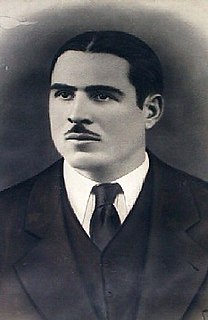
Luciano Leggio was an Italian criminal and leading figure of the Sicilian Mafia. He was the head of the Corleonesi, the Mafia faction that originated in the town of Corleone. He is universally known with the surname Liggio, a result of a misspelling in court documents in the 1960s.

Jack Ignatius Dragna was an American Mafia member and Black Hander who was active in both Italy and the United States in the 20th century. He was active in bootlegging in California during the Prohibition Era in the United States. In 1931, he succeeded Joseph Ardizzone as the boss of the Los Angeles crime family after Ardizzone's mysterious disappearance and death. Both James Ragen and Earl Warren dubbed Dragna the "Capone of Los Angeles". Dragna remained the boss of the Los Angeles crime family from 1931 until his death in 1956.

Vincent Michael Rizzotto was an American prelate of the Roman Catholic Church. Bishop Rizzotto served as an auxiliary bishop of the Archdiocese of Galveston-Houston from 2001 to 2006.
Sergente Cosimo Rizzotto was a World War I flying ace credited with six aerial victories.

Placido Rizzotto was an Italian partisan, socialist peasant and trade union leader from Corleone, who was kidnapped and murdered by Sicilian Mafia boss Luciano Leggio on 10 March 1948. Before he was killed, Rizzotto was performing activist work with farm laborers, trying to help them take over unfarmed land on large estates in the area. A 12-year-old shepherd, Giuseppe Letizia, witnessed Rizzotto's murder and was killed the following day with a lethal injection, made by a Mafia doctor Michele Navarra. In the 1960s, Leggio was acquitted twice of Rizzotto's murder due to lack of evidence.
Pasquale Scimeca is an Italian film director and producer.

La falena is a 1916 silent Italian drama film directed by Carmine Gallone. The film is considered to be lost, with only a fragment surviving in the film archive of the Cineteca Italiana.

Malombra is a 1917 silent Italian drama film directed by Carmine Gallone. The film was shown as part of the Silent Divas of the Italian Cinema programme at the 38th New York Film Festival in 2000. It is an adaptation of the 1881 novel Malombra by Antonio Fogazzaro, which was later adapted into a 1942 film of the same name.
The Concerto per Trombone e Orchestra in C was composed by Italian composer Nino Rota in 1966. The concerto is in three movements:
- Allegro giusto
- Lento, ben ritmato
- Allegro moderato

Fabiola is a 1918 Italian silent historical film directed by Enrico Guazzoni and starring Augusto Mastripietri, Amleto Novelli and Elena Sangro. It is an adaptation of the 1854 novel Fabiola by Nicholas Patrick Wiseman about the rise of Christianity in the Roman Empire. It was one of a series of historical epics for which the Italian film industry became famous during the era. The novel was later turned into a sound film of the same name in 1949.

Rocca Busambra is the highest peak in the Monti Sicani, in western Sicily, southern Italy. It has an elevation of 1,613 metres (5,292 ft).

Laura de Carvalho Rizzotto is a Latvian-Brazilian singer, songwriter, pianist and guitarist. She released her debut studio album Made in Rio in 2011 through Universal Music Brazil, which included the single "Friend in Me". In 2014, she independently released her second studio album Reason to Stay, and independently released the extended play RUBY in 2017.

Supernova is a Latvian music entertainment show created by the Latvian broadcaster, LTV. It is currently used as the Latvian national selection for the Eurovision Song Contest.
The Lady of the Camellias is a 1915 Italian historical drama film directed by Baldassarre Negroni and starring Hesperia, Alberto Collo, and Ida Carloni Talli. It is an adaptation of Alexandre Dumas, fils' novel The Lady of the Camellias. Another Italian version The Lady of the Camellias was released the same year.
The Sunsás orogeny was an ancient orogeny active during the Late Paleoproterozoic and Mesoproterozoic and currently preserved as the Sunsás orogen in the Amazonian Craton in South America. About 85% of the belt is covered by Phanerozoic sediments. Among the remaining 15% of the orogen exposed at surface the best outcrops lies around the Bolivia-Brazil border. It is thought that the original orogen once spanned an area from Venezuela to Argentina and Paraguay. The western and southeastern fringes of the Sunsás orogen have been incorporated into the Andean orogeny and the Brasiliano orogeny respectively. The Sunsás orogeny was active during four separate phases:
Latvia participated in the Eurovision Song Contest 2018. The Latvian broadcaster Latvijas Televīzija (LTV) organized the national final Supernova 2018 in order to select the Latvian entry for the 2018 contest in Lisbon, Portugal.

"Funny Girl" is a song written and performed by Latvian-Brazilian singer Laura Rizzotto. The song was released as a digital download on 6 December 2017. It represented Latvia in the Eurovision Song Contest 2018 in Lisbon, Portugal.
Now Sicily is a regional centrist Italian political party active in Sicily.
This page is based on this
Wikipedia article Text is available under the
CC BY-SA 4.0 license; additional terms may apply.
Images, videos and audio are available under their respective licenses.










